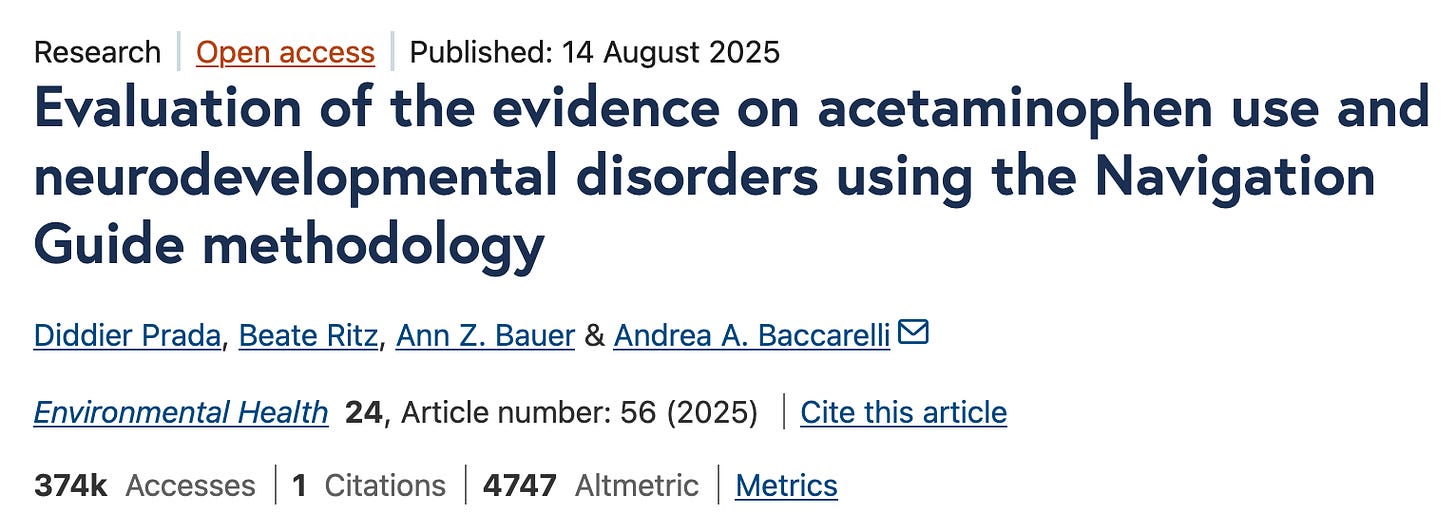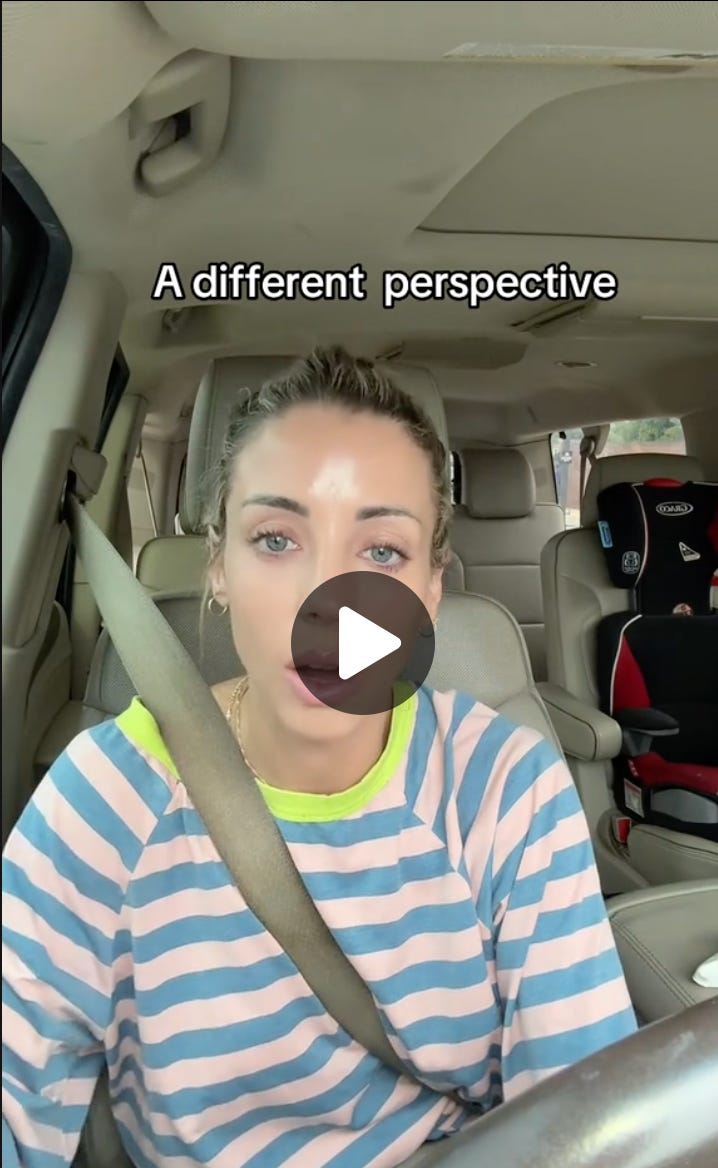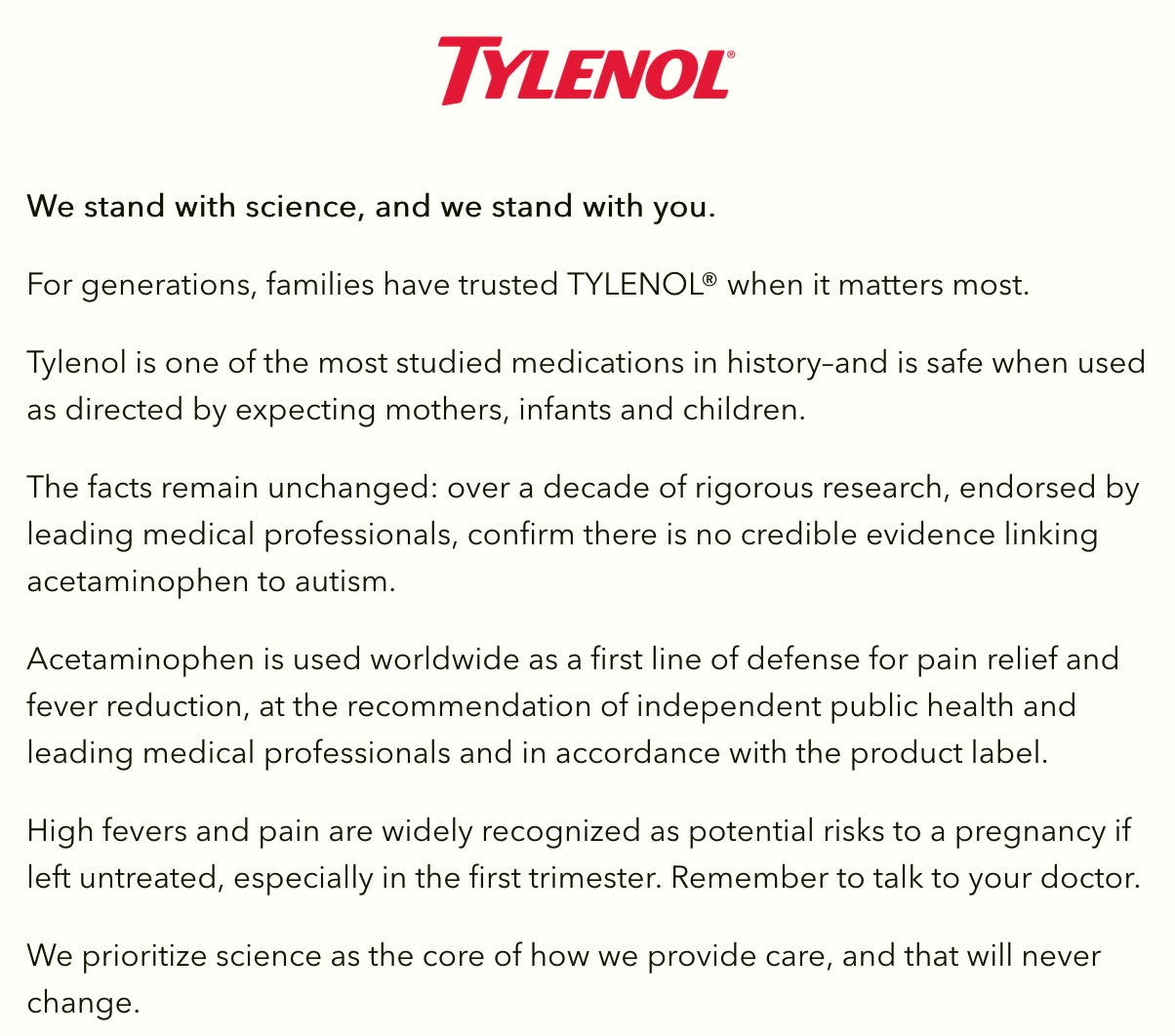You asked. Here are the answers.
In the wake of the disastrous press conference on Tylenol and autism, a lot of you had questions about why I and so many other physicians have been so forcefully countering what was said.
Earlier this week, I posted a carousel on Instagram going over some of the things that had been said in Monday’s press conference and why they were false. Most people understood why I, like so many others, disagree with RFK Jr, the president, Marty Makary, and Mehmet Oz. But, understandably, a lot of people had questions. I’m not sure they were all in good faith, but since there were several questions that came up over and over again, I thought it might be helpful to address them. Here are the five most commonly asked questions:
1. What about the Harvard study, though? I assume most people asking this were referring to a study that came out last month, conveniently just before RFK Jr’s self-imposed deadline of figuring out the cause of autism by September, with a senior author from Harvard. The other authors are at Mt. Sinai, UCLA, and University of Massachusetts. One thing I found interesting about this was the same folks who are anti-intellectualism all of a sudden seemed more than happy to throw the Harvard name in my face. But let’s talk about why this study isn’t causing physicians, scientists, and medical societies to panic about acetaminophen (the active ingredient in Tylenol). The study itself is a review. It is not, as some said in my comments, a meta-analysis. That is because there was too much heterogeneity, meaning the studies were too different from each other, to combine them. Of the 46 studies in the paper, only 7 looked at autism as an outcome. Overall, the authors concluded the data showed a correlation between acetaminophen and autism, but the study design did not allow them to make any causal conclusions. This, btw, is the same conclusion in the FDA letter that was distributed after the press conference, despite the fact that Marty Makary told the press the study showed a causal relationship.
This is a little nerdy, but it’s worth discussing for just a moment what kinds of studies do allow for causal conclusions. This is a pretty basic overview for those interested. Although I am not intending to do a deep dive on causal inference, the classic study design for this would be a randomized, controlled trial (RCT), where participants are randomly allocated to a condition. For example, if one wanted to test whether acetaminophen causes autism, one could randomly assign pregnant people to one condition, where they do take acetaminophen, or another condition, where they do not. The act of randomization should, on a large enough scale, minimize any differences between the two groups except for their exposure to acetaminophen, thus allowing us to know whether taking acetaminophen had an impact on pregnant people or their children. This would not be ethical to do, however, so we will not have those kinds of data (it would be unethical for multiple reasons, one of which is it would require withholding acetaminophen from some people who would benefit from it, eg pregnant people with fever. It’s also unethical, by the way, to perform an RCT of vaccines vs nothing at this point in time because it would be inappropriate to withhold vaccines, which are safe and effective, from any group of people).
Back to this study, it’s also worth noting the senior author on the study, the one who currently works at Harvard, presumably making this a “Harvard study” in people’s minds, was paid $150,000 to testify against Tylenol in a trial. According to the judge in the case, he “cherry-picked and misrepresented study results.” She also said, “Dr. Baccarelli downplays those studies that undercut his causation thesis and emphasizes those that align with his thesis.” Because his testimony was “unreliable,” she threw it out.
The last thing I’ll say about this is the quality of the science is not dictated by the institution where it is conducted or where the authors work. It is the work itself that matters. So if you say, “A Harvard study shows…” that doesn’t really tell me much except where the authors are from. I’m much more interested in what they studied and how.
2. What about trusting the science? This question is interesting to me because what we are doing is trusting the science. Just taking the word of RFK Jr, a person who has no scientific or medical expertise, is not trusting the science. It’s trusting a grifter. Those of us who have been trying to educate about what the data actually do show are taking a look at the evidence on the subject, which is more than just this one paper that came out last month. And I definitely understand how this could be confusing. But, in general, we do not tend to make any definitive conclusions from any one paper. Instead, we look at the different studies and assess the level of evidence (again, RCTs yield almost the highest quality of evidence, only exceeded by meta-analyses of RCTs, while other designs, such as case series, provide lower quality evidence. Incidentally, the famous, fraudulent, now-retracted, study that started the whole panic about vaccines and autism was a case series).
Then, we synthesize the data, taking into account varying data quality. In the case of the acetaminophen/autism question, there was a relatively high-quality study that came out last year that compared siblings to each other. Since we know a large component of autism is genetic, and environmental factors are also important, if we want to assess the impact of acetaminophen but cannot do a randomized, controlled trial for the reasons stated above, this is the next best thing, allowing us to compare people who have similar genetics and environments, with the pregnant person having taken acetaminophen in one pregnancy but not in the other. This study included over 2 million participants and found that once they adjusted for sibling pairs, there was no association, meaning not even a correlation, between acetaminophen and autism. In addition, we know the indications for taking acetaminophen, namely fever and pain, if left untreated are harmful to a fetus. So even in the studies where there is a correlation, it seems plausible the correlation may not be between acetaminophen and autism, but actually between fever and poorer health outcomes. No, I cannot prove that to you. We would need a study (ideally more than one) that assessed those factors. Lacking that, when we look at the preponderance of the evidence, and the downside of not taking acetaminophen when indicated, all relevant major medical societies (American Board of Obstetrics and Gynecology, American Academy of Pediatrics, the Society for Maternal-Fetal Medicine, the American College of Emergency Physicians, etc) have made statements this week reassuring pregnant people it is safe, based on the available evidence, to take acetaminophen as indicated, including for children.
3. Ok, but if there might be a correlation, shouldn’t we warn pregnant people, just to be safe? I can understand why one might thing this would be prudent. However, as noted above, there are negative consequences for the fetus and the pregnant person if fever and pain are ignored. Most pregnant people are very nervous about making sure they don’t unintentionally harm their fetus—and understandably so! Many would interpret a warning like that as an indication they should not, under any circumstances, take acetaminophen. In fact, I came across a video yesterday in which a young woman generously shared that she had done exactly that in her first pregnancy. Despite having a fever, she had chosen not to take acetaminophen because she had heard it might be harmful. She sadly lost that pregnancy, and although it is hard to know for sure, her untreated fever may have contributed. That is only one story, I know, but it illustrates why it actually is harmful to tell people to avoid something “just in case.” In addition, we could apply this line of thinking to just about anything: if you get in a car, there’s a chance you will get in a car accident, so maybe pregnant people shouldn’t get in a car; if you eat at a restaurant, you could get food poisoning, so maybe pregnant people shouldn’t eat out; if you spend time in the sun, you could get skin cancer, so maybe none of us should ever go outside. I think you get the gist.
4. But even Tylenol themselves said pregnant people shouldn’t take it. This refers to a tweet from 2017, which appears to be from the company’s main account. The tweet says, “We actually don’t recommend using any of our products while pregnant. Thank you for taking the time to voice your concerns today.” The company has now said that tweet was “taken out of context.” Although I am not sure what that context is, I do want to point out they have put out a statement this week that is counter to that tweet. For reasons that are likely obvious, the HHS account and the White House account both shared that tweet, but not the updated statement. I’m not saying this because we should take a company’s word on their product—they obviously have a vested interest in convincing people it is safe and effective—but because people keep bringing up that tweet. Here is their updated statement, which is an automatic pop-up if you go to their website. Notice they say, “Tylenol is one of the most studied medications in history—and is safe when used as directed by mothers, infants and children.” They also say they do not make recommendations on medications during pregnancy because “that is the job of a healthcare provider.”
5. I don’t support the Hep B vaccine for newborns! I know this one isn’t about acetaminophen, but since the president also discussed the Hepatitis B vaccine during the press conference and encouraged people to delay vaccination until age 12, it’s worth addressing why newborn vaccination has been implemented since the early 1990s. The first reason requires understanding transmission of Hepatitis B. Yes, it can be transmitted sexually, as the president said. And that means it can be transmitted from a pregnant person to their child during and around the time of delivery. In addition, it can be transmitted from exposure to bodily fluids of other people in the newborn’s household or needles. Importantly, newborns who are infected with Hepatitis B are very likely to go on to develop a chronic infection (about 90% of them do). About one-fourth of those who develop a chronic infection die from liver disease. Luckily, the vaccine is very effective at preventing infection. Prior to the implementation of newborn Hepatitis B vaccination, about 18,000 newborns a year were infected with Hepatitis B; in 2022, there were only 13 cases. People who contract Hepatitis B later in life have a lower risk of chronic infection and therefore lower risk of complications such as cirrhosis or liver cancer. Therefore, the most optimal time to try to prevent infection is when it would prevent the most harm, which is among newborns. According to the Children’s Hospital of Pennsylvania, from 2000 to 2019, newborn Hepatitis B vaccination prevented an estimated 22 million deaths worldwide. In the US, of the 18,000 newborns infected with Hepatitis B annually prior to newborn vaccination, about half contracted it from their parent, and the other half contracted it from household and other exposures. That is part of why testing pregnant women and only vaccinating the newborns of those who test positive is not optimally effective.
I hope this helps answer some common questions. I know this can all be very confusing, but those of us out here trying to tell you the truth have nothing to gain personally. I don’t treat pregnant people or newborns. I don’t give anyone vaccines. I just want you to have the highest quality information to be able to make the best possible decisions for you and your family. RFK Jr, on the other hand, has had a decades long crusade attacking people with autism, acting like they don’t deserve to live and should be completely eliminated (that’s because he’s a eugenicist). He promised a “cause” for autism by September, which was completely unrealistic, and needed to deliver. In the meantime, the “treatment” they recommended, leucovorin, is sold by a company of which Mehmet Oz is an investor.





They are using the same tactics as against tobacco harm reduction, the misapplying of scientific studies (cherry picking, not taking a look at the consensus, dubious claims of causality).
It seems so familiar, taken from the WHO approach to THR. If that isn't the template used, then it is an uncanny coincidence.
Info from Clive Bates (Ex ASH director): https://clivebates.com/category/who/
100 experts:
https://clivebates.com/expert-statements-on-who-and-tobacco-harm-reduction/